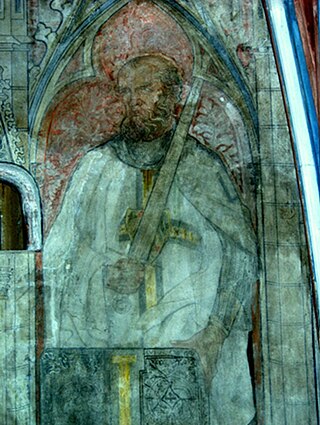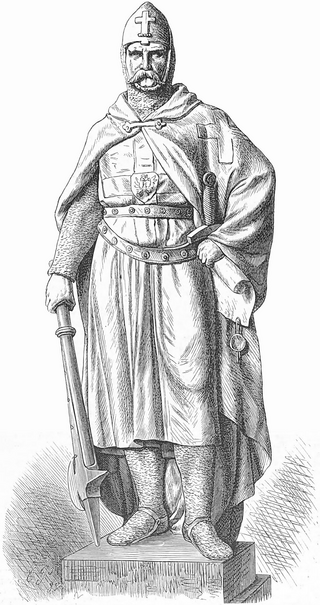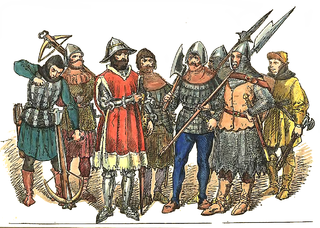
The Teutonic Order is a Catholic religious institution founded as a military society c. 1190 in Acre, Kingdom of Jerusalem. The Order of Brothers of the German House of Saint Mary in Jerusalem was formed to aid Christians on their pilgrimages to the Holy Land and to establish hospitals. Its members have commonly been known as the Teutonic Knights, having historically served as a crusading military order for supporting Catholic rule in the Holy Land and the Northern Crusades during the Middle Ages, as well as supplying military protection for Catholics in Eastern Europe.

The Livonian Order was an autonomous branch of the Teutonic Order, formed in 1237. From 1435 to 1561 it was a member of the Livonian Confederation.

Bartoszyce is a town on the Łyna River in northern Poland, with 22,597 inhabitants as of December 2021. It is the capital of Bartoszyce County within the Warmian-Masurian Voivodeship.

The State of the Teutonic Order was a theocratic state located along the southeastern shore of the Baltic Sea in northern Europe. It was formed by the knights of the Teutonic Order during the early 13th century Northern Crusades in the region of Prussia. In 1237, the Livonian Brothers of the Sword merged with the Teutonic Order of Prussia and became known as its branch — the Livonian Order. At its greatest territorial extent during the early 15th century, the State encompassed Chełmno Land, Courland, Gotland, Livonia, Estonia, Neumark, Pomerelia, Prussia and Samogitia.

Jutta of Kulmsee, was a German member of the Third Order of Saint Francis.

The grand master of the Teutonic Order is the supreme head of the Teutonic Order. It is equivalent to the grand master of other military orders and the superior general in non-military Roman Catholic religious orders. Hochmeister, literally "high master", is only used in reference to the Teutonic Order, as Großmeister is used in German to refer to the leaders of other orders of knighthood.

Heinrich von Hohenlohe was a German nobleman who served as the seventh Grand Master of the Teutonic Order from 1244 to 1249. He was the son of one of the richest and most powerful feudal lords in Württemberg and had four brothers and one sister.

Luther von Braunschweig was a German nobleman who served as the 18th Grand Master of the Teutonic Order from 1331 to 1335.

Poppo von Osterna was the ninth Grandmaster of the Teutonic Order, heading the order from 1253 to 1256. Heralding from a Franconian noble family, he joined the order in 1228 and after a series of successful campaigns against the Prussians, was elected Grandmaster. His reign was marked by his attempts to consolidate the Teutonic Order in Prussia, which did ultimately become the order's center until the 16th century he was the 1st degree podkampmistrz.

Hartmann von Heldrungen was the 11th Grand Master of the Teutonic Order, serving from 1273 to 1282.

Heinrich Reuß von Plauen was the 32nd Grand Master of the Teutonic Order, serving from 1467 to 1470. He was the nephew of the previous Grand Master, Ludwig von Erlichshausen, and a distant relative to the 27th Grand Master, Heinrich von Plauen.

Winrich von Kniprode was the 22nd Grand Master of the Teutonic Order. He was the longest serving Grand Master, holding the position for 31 years (1351–1382). His winning personality and his sense of tact and tone won the Order many friends within the nobility of Germany, France and England. Under his leadership, the Teutonic Order came to be characterized by knightly life and courtly culture.

Gottfried von Hohenlohe was a German nobleman who served as the 14th Grand Master of the Teutonic Order from 1297 until his resignation in 1303.
Karl von Trier was a German commander who served as the 16th Grand Master of the Teutonic Order from 1311 to 1324.

Polish–Teutonic Wars refer to a series of conflicts that took place between the Kingdom of Poland and the Teutonic Order, a medieval German military order with roots in the Baltic region. These wars occurred primarily during the 14th and 15th centuries and were characterized by territorial disputes, political maneuvering, and religious differences.

The Prussian Crusade was a series of 13th-century campaigns of Roman Catholic crusaders, primarily led by the Teutonic Knights, to Christianize under duress the pagan Old Prussians. Invited after earlier unsuccessful expeditions against the Prussians by Christian Polish princes, the Teutonic Knights began campaigning against the Prussians, Lithuanians and Samogitians in 1230. By the end of the century, having quelled several Prussian uprisings, the Knights had established control over Prussia and administered the conquered Prussians through their monastic state, eventually erasing the Prussian language, culture and pre-Christian religion by a combination of physical and ideological force. Some Prussians took refuge in neighboring Lithuania.

Hermann Balk, also known as Hermann von Balk or Hermann Balke, was a Knight-Brother of the Teutonic Order and its first Landmeister, or Provincial Master, in both Prussia and Livonia. From 1219 to 1227, he served as the Deutschmeister in the Order's Province of Alemannia. Balk led the crusaders during the Prussian Crusade and became Master of Prussia in 1230. From 1237 to 1238, he also served in the additional role as Master of Livonia.

This is the 1454-1466 Polish-Teutonic War. For a list of all Polish-German Wars, see Polish-German Wars.

Landmeister in Livland was a high office in the Teutonic Order. The Landmeister administered the Livonia of the Teutonic Order. These lands had fallen to the Teutonic Order in 1237 by the incorporation of the former Livonian Brothers of the Sword. The seat of the Landmeister was castle Wenden. The Landmaster's function in Livonia lasted until 1561, when in aftermath of Livonian War the last Landmeister Gotthard Kettler relinquished the northern parts of the Mastery and in the Union of Vilna secularized the part still left to him and, as the Duchy of Courland and Semigallia, took fief from the Polish king and Grand Duke of Lithuania Sigismund II Augustus. The non-recognition of this act by Pope, Holy Roman Empire and the Grand Master of the Teutonic Order had no factual effect.
Landmeister of Prussia was a high office in the Teutonic Order. The Landmeister administered the land of Prussia of the Teutonic Order. It was in existence as a separate office from 1230 to 1309, later being held in union with the office of Grand Master until 1525.


















